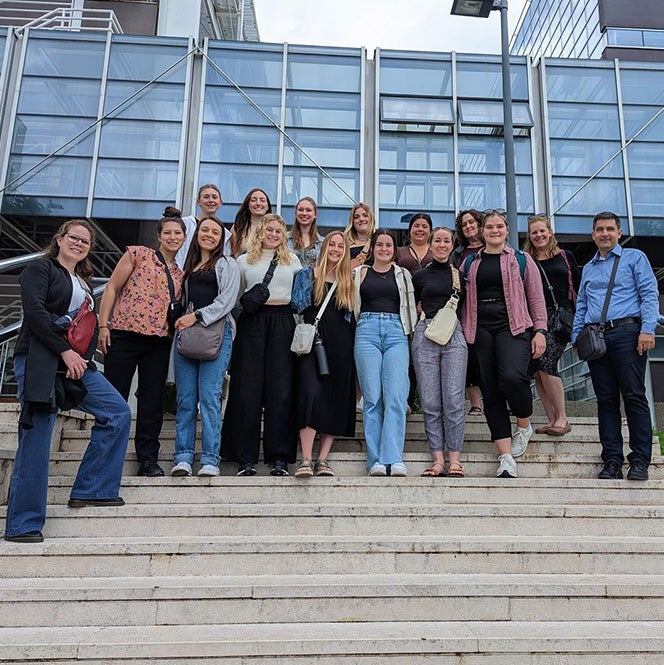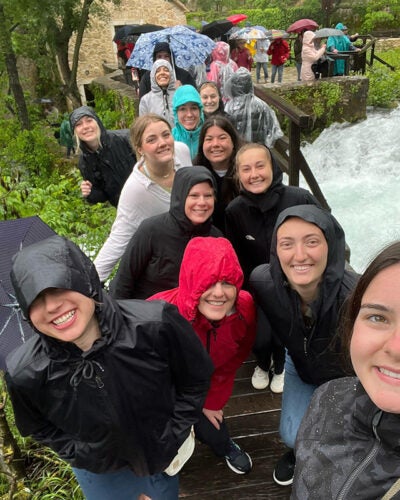For many students, a typical summer abroad might include traveling, reading and a little bit of sight-seeing. Perhaps less typical is simultaneously learning about the healthcare system in Croatia.
Led by Professor Kelley Connor of the School of Nursing and Professor and Chair of the Department of Radiologic Sciences Leslie Kendrick, a group of 14 health sciences students traveled to Split, Croatia in May. Students in programs across the college participated in the study abroad opportunity, from nursing and radiologic sciences to public and population health.

Many study abroad experiences balance education and adventure, and this trip was no different. The class visited the city of Dubrovnik, the waterfalls in Croatia’s Krka National Park and the islands of Hvar and Vis.
“I would recommend study abroad to anyone who has the means to go,” said nursing student Heather Burkman. “Going to Croatia was my first time going overseas and I feel that I grew a lot from it. It’s important to keep an open mind and experience new perspectives. I also met some amazing people who made it a wonderful experience.”
Exploring culture, history and health
Before they ever left the country, the class began with assignments to build foundational knowledge about Croatia’s culture and history, as well as aspects of its healthcare system. The goal was for students to familiarize themselves so that when they arrived, they could have a better understanding of what they experienced and could ask informed questions.
One part of the pre-trip coursework included reading and discussing “Mother Tongue” by Taina Romanov. The biographical book follows three generations of a family and explores how the various regional changes in Yugoslavia impacted their lives.
Another assignment is what Connor described as a “windshield study” in which students look at how culture impacts health. Students holistically evaluate a community for the availability of health care, schools, food, spiritual communities and leisure activities.
“We looked at things like the walkability of the city, and if you’re walking everywhere, what does that do for your health?” Connor explained. “You’re trying to look at the community as a whole to see what types of access would a person have to engage fully in their community.”
Students completed a practice study for a community in Idaho before they left. Then, they completed an assessment in Croatia and discussed their findings together.
Understanding the healthcare system
The group partnered with Dr. Zoran Valic, a professor at the University of Split School of Medicine. Valic led various activities that were designed to give students a better understanding of the Croatian healthcare system. They toured University Hospital Split’s sleep lab, attended classes and visited with medical students in an informal mixer.

These experiences culminated in a class discussion about the differences and similarities of the Croatian and American healthcare systems.
“One thing that made the biggest impact on me while I studied abroad in Croatia was the similarities within their health care system,” said Burkman. “They have a universal health care system unlike the U.S., but they face a lot of the same challenges: many citizens struggle with wait times to see a [primary care provider] and to receive affordable health care due to staffing shortages.”
The class then pondered what works well and what doesn’t, and what Croatian elements might or might not translate to America.
“The end of it is, there’s no right or wrong answer; it’s just different ways of doing it,” said Connor.
Broader perspective for future careers
Many health sciences programs function in a cohort model, which Connor pointed out often makes it difficult to fit in study abroad opportunities. “So we feel fortunate that we’re able to bring this to students,” she said.
“What we really try to do is help them to think about things outside of Idaho so that when they’re practicing, they have a wider breadth of knowledge that they can pull from and they can try to apply it in different ways here,” said Connor. “It helps them think broader.”
“Croatia will impact my future career because I realized all people struggle with healthcare needs,” said Burkman. “No matter how the system is set up, it isn’t perfect…All patients should be treated the same despite their financial situation and intensity of medical needs.”